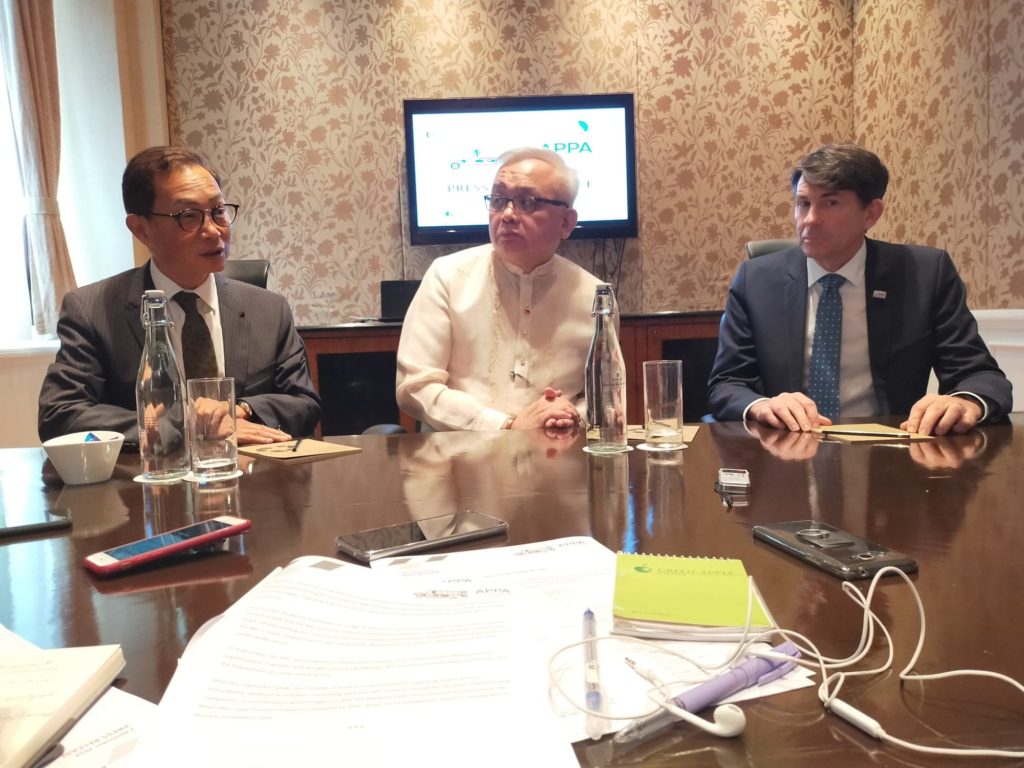
Stephen Kai-Yi Wong of the Office of the Privacy Commissioner for Personal Data in Hong Kong (from left), Philippine Privacy Commissioner Raymund Enriquez Liboro, and Commissioner Michael McEvoy of the Office of the Information and Privacy Commissioner in British Columbia, discuss the importance of data protection. | Irene R. Sino Cruz
LAPU-LAPU CITY, Philippines — Amid the emerging technology trends and threats that impact privacy, the 52nd Asia Pacific Privacy Authorities (APPA) Forum aims to to focus on ways to ensure stronger data protection.
Delegations from 19 jurisdiction in the Asia Pacific region have joined the 2-day forum being held at the Shangri-La’s Mactan Island Resort and Spa that opened Monday.
In his opening remarks, Philippine Privacy Commissioner Raymund Enriquez Liboro stressed the need to ensure the privacy regulations across Asia Pacific would be responsive not just to safeguard individual rights and protect personal data but also to facilitate the safe flow of information.
A strong data protection would fuel economic progress in an era dominated by information and communication technology, Liboro said.
“Value in today’s data-driven world is created by building bridges ànd not walls. And that’s what we intend to accomplish today at the bi- annual APPA forum,” he told the delegates. “To build bridges towards a future that is safe and progressive, which our children could immensely benefit from.”
Liboro said that the hosting of the forum would benefit the country at a time when data privacy and protection is at the forefront of everyone’s consideration.
“Hosting it here sends a strong signal outside, including the 21 APPA members, that the Philippines is a safe destination for data, where businesses can be conducted here in a safe manner by way of protecting personal data not only of citizens but also of citizens from other jurisdictions,” he said.
McEvoy
Michael McEvoy, commissioner of British Columbia Office of the Information and Privacy Commissioner, cited the need for regulators to work together to ensure data protection.
“I think Commissioner Liboro has referred to the fact that amongst Asia Pacific communities, including British Columbia and Canada, trade is predominantly … Where trade goes, so does the data of all our citizens,” McEvoy pointed out. ” I think, more than ever, it is incumbent on us regulators to cooperate and coordinate our efforts to make sure that the data of our citizens are protected.”
This could only be done through coordination of efforts among regulators since data goes across borders in milliseconds, he added.
McEvoy also admitted that regulators’ enforcement efforts had been limited by lack of authority to sanction violators.
“Our office has just finished, together with the Office of Privacy Commissioner of Canada, our investigation of Facebook, Cambridge Analytica and a company called AggregateIQ. One of the things we found frustrating at the end of the day, is that we did not have the authority to impose meaningful sanctions like fines,” he pointed out.
The three companies allegedly used personal information of up to 87 million Facebook users globally and have been used to influence elections.
According to McEvoy, the lack of authority to impose sanctions on the three companies served as a wake up call not only to the Canadian, British Columbia governments but also to other jurisdictions throughout the world that “to properly protect our citizens, meaningful sanctions have to be in place.”
Kai-Yi Wong
Stephen Kai-Yi Wong, privacy commissioner for personal data in Hong Kong, agreed that there should be cooperation among jurisdictions with regards to investigations and harmonizations of rules and practices.
“The world is driving towards a common approach, in relation to law enforcement, in relation to collaboration of investigation, exchange if information and intelligence about the data breach, especially of the tech giants,” Wong said.
Through the efforts of APPA, jurisdictions could share investigation practices and the concerted efforts to promote no violence as well as social responsibility among tech giants, including social platforms used in posting messages, he added.
The 2-day closed door sessions include discussions on new policy directions across the region./dbs